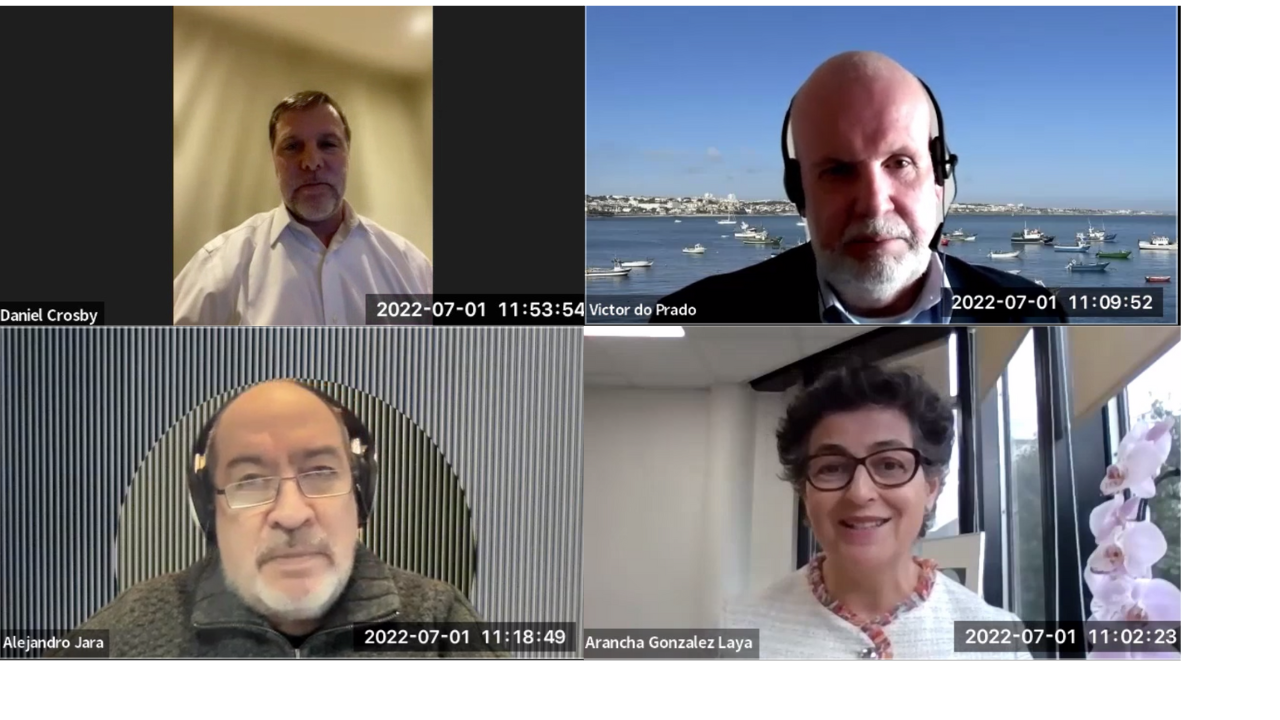
A New World Economic Order?
On July 01, 2022, AUWCL’s Trade, Investment and Development Program invited a group of eminent experts to discuss the current challenges for the World Economic Order. Panelists included Daniel Crosby, Arancha González, Amb. Alejandro Jara and Victor do Prado. Padideh Ala’i, Professor of Law at AUWCL and Director of the Trade, Investment and Development Program, moderated the session. Prof. Ala’i introduced the topic by indicating that after World War II states engaged in an artificial distinction between economic and non-economic activities, which does not really exist. The economic and non-economic spheres of social existence are closely interrelated, and humankind’s task should be to create a sustainable legal order among the world’s nations.
Arancha González Laya, former Minister of Foreign Affairs of Spain and now Dean of the Paris School of International Affairs at Science Po, identified what she considers the principal challenges of the multilateral world order. The first challenge she identified is populism. Populism denies the effectiveness of international co-operation, it focuses on borders and re-nationalizes responses to the world’s challenges. The second challenge faced by multilateralism is geo-political tensions between the US and China, followed by economic impacts caused by the pandemic, which in turn fueled inflation. To top all that, the war in Ukraine added more to these challenges.
She also discussed the very notion of multilateralism. For some observers, multilateralism is a foreign concept and something that has been built by others. There is a desire to change it. For others, multilateralism is developed for national domestic policies. Other commentators look at multilateralism as a guarantee against power where the states have limited ability to exercise influence. The changing definition of multilateralism is affecting the WTO. Since 2013, when the last big trade agreement was drafted, the WTO has experienced many setbacks in several negotiations, partly because of differing views about the function of the multilateral trading system.
Ms. González offered an outlook to two possible future scenarios: One scenario could be the complete paralysis of the WTO and fragmentation of the international trading system. The result of this scenario would be slowing trade, innovation, and investments. Another scenario could be slow progress of multilateral cooperation, which has already happened in practice. The results of WTO ministerial conferences regarding the substance of trade regulation are modest, but they represent an important signal at a time of strong polarization during the Ukraine war. She further added that logistics, food, and vaccines are sectors where governments have already been able to generate a more effective regulatory framework.
Victor do Prado, former Director of Council and TNC Division at the WTO and now faculty at the World Trade Institute, said the current international trade laws are still considered useful, but they may not be considered enough as these laws need to address new challenges. The international organizations may only be legitimate and helpful if they are capable of finding solutions and responses to the many problems of today. These problems include climate change, health issues, future pandemics, digitization and its response by various countries. There are also old, unresolved issues, such as agriculture and food crises. He also pointed out that the debate about the WTO’s role in the current world order is ongoing. Some consider the WTO should only address market opening and tariffs and services, while others consider it should deal with more things like trade and health, or trade and gender. The ministerial conferences have made some progress on these but there is a lot to be done in this regard.
Amb. Alejandro Jara, former Permanent Representative of Chile to the WTO, argued that for the WTO system to survive it needs reform. The facts and information must be available for everyone and should be understood by everyone, to work well together. Such an approach would require enhanced transparency. He stated that the WTO Secretariat has done well on information accessibility, but more can be done by academia, think tanks and other NGOs. Alejandro Jara further said that reform at the WTO means creating flexibilities. It is ultimately the governments’ responsibility to create development but civil society should contribute in several ways to strengthen the economies.
Daniel Crosby, managing partner of King & Spalding’s Geneva office, said the international order and the WTO are built on principles. The key challenge happens when the actors of the system no longer believe in the fundamental principles on which the order is based. This may lead to tensions among countries with differing ideas on whether these principles are equitable and fair; and whether and why the principles are enforced on every country or only on a selected few. He demanded a review of the hitherto common understanding that open markets are good for developing countries. Maybe these countries are looking for more international cooperation and better tariffs. He considers that while preparing for the Ministerial Conference No. 13, more thought needs to go in understanding if we are fighting against the WTO or working with it.
All panelists agreed that we are experiencing an extremely complex time both on the level of economic cooperation between countries, as well as in geopolitical terms. The notion of multilateralism continues in stark tension with unilateral action by some states. The pandemic, populist political movements, the lack of due attention to climate change, and the general economic turmoil that these and other related phenomena have caused, has many governments push back on multilateralism, trying to find solutions in nationalist or at least unilateral approaches.